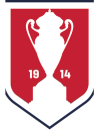That marked the birth of a dynasty. The Kickers spent the next ten years winning California State titles and sniffing around national Finals. In 1960, they finished Open Cup runners-up – led by Al Zerhusen, who would go on to play in the Olympic Games of Melbourne in 1956. He also became a regular in the U.S. National Team and was inducted into the National Soccer Hall of Fame in 1978. That 1960 Final, played at Edison Field in Philadelphia needed two overtime periods before the eventual four-time Champion Ukrainian Nationals edged the Kickers 5-3 behind a five-goal day from Mike Noha.
That game’s gone down in history as one of the greatest Open Cup Finals ever played, with the Philadelphia ‘Ukes’ twice coming from behind to beat the Kickers.
The Kickers didn’t stay on the canvas for long. They were back on the winners’ podium in 1964. And in the intervening decade between the Kickers’ pair of wins, LA teams went on a tear. The McIlvaine Canvasbacks – from the LA neighborhood of San Pedro – won the 1959 Final over Massachusetts' Fall River SC and the LA Scots and LA Armenians were Runners-up in 1961 and 1963 respectively.
The 1964 Final was played over two legs and allowed the Kickers to earn some revenge in a rematch against the reigning ASL-Champion Philly Ukrainians. The first leg was played at Cambria Field in Philadelphia, PA (site of the 1960 Final) and it ended 2-2 after extra-time. The second leg, at Wrigley Field in Los Angeles, ended 2-0 for the Kickers, with Helmut Weiss scoring two of the Kickers’ four and the icon Zerhusen, who passed away in 2018 at the age of 86, grabbing the first.
Between 1965 and the heyday of the North American Soccer League (NASL) in the early 1970s, LA-Area teams had to be content with Runners-up finishes at the Open Cup. Orange County SC came second in 1966 and 1967. The same was true for the Montebello Armenians in 1969, LA Croatia in 1970 and the San Pedro Yugoslavs twice in 1971 and 1972
Maccabee Dynasty & the MLS Years
From 1972 to 1984, while the NASL was in full-flow and enticing a raft of global stars like Pele, Franz Beckenbauer and Johan Cruyff, the Open Cup continued on without it. The glitzy new national league decided not to take part in the country’s oldest tournament and the reasoning, according to the learned Dr. Joe Machnik, was simple. “They were afraid they’d lose and be embarrassed,” exclaimed the U.S. soccer pioneer and, incidentally, an Open Cup winner in 1965 with the New York Ukrainians.
The NASL’s LA Aztecs or the San Jose Earthquakes, both clubs where the legendary George Best had playing stints, might not have lost all their games against the part-time, semi-pro heroes of LA’s Maccabee AC, but they certainly would have lost a few.
READ: Maccabee AC: Hollywood’s Five-Star Dynasty
The Maccabees, founded by Jewish immigrants, several of them Holocaust survivors, boasted bona fide stars of their own like Benny Binshtock, who worked as toy designer for Mattel in his day job. Also in the Maccabees mix was defender Eric Braeden – star of stage and screen – who played soccer under his birth name of Hans-Jorg Gudegast while acting on such TV staples of the time as Rat Patrol and Combat, and later, as Victor Newman on the Soap Opera The Young and the Restless.














